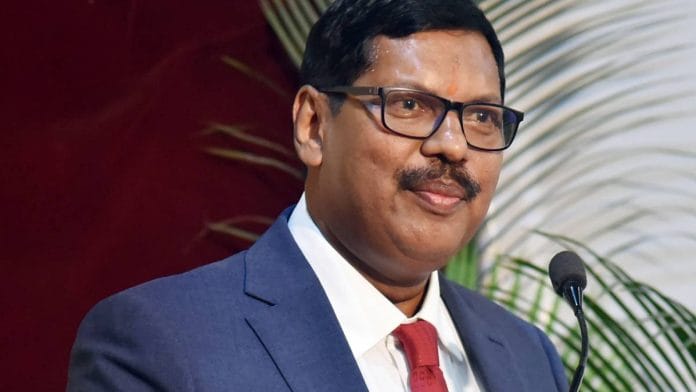New Delhi: Chief Justice of India (CJI) B.R. Gavai has called for the revival of a legal principle laid down by former Supreme Court judge Justice V.R. Krishna Iyer in 1977: “Bail is the rule, jail is the exception”.
Speaking at the 11th Justice V.R. Krishna Iyer Memorial Law Lecture on Sunday in Kochi, CJI Gavai praised the former Supreme Court judge’s work and said this principle had been neglected in recent years.
“Justice Krishna Iyer also strongly believed that undertrials should not be kept in jail for long periods without trial. He is well known for breaking new ground in the Indian judiciary by asserting what was once considered a taboo: ‘Bail is the rule, and jail is the exception’ in the recent past, this principle was somewhat forgotten.”
“Every time a bench prioritises substantive justice over technicalities, every time a judgment expands the protective umbrella of fundamental rights for the vulnerable, every time the court exercises its powers to uphold human dignity and social equity, Justice Krishna Iyer’s legacy is not just honoured, but actively lived,” he added.
Birth of this principle
This principle originates from the landmark judgment in the 1977 Supreme Court State of Rajasthan, Jaipur, vs Balchand case.
The Supreme Court, in its ruling, emphasised that bail is the general rule and imprisonment is the exception, particularly in the context of personal liberty restrictions, which has also been used in many other judgments in the last 48 years.
“The basic rule is bail, not jail, except where there are circumstances suggestive of fleeing from justice or thwarting the course of justice or creating other troubles in the shape of repeating offenses or intimidating witnesses and the like by the petitioner who seeks enlargement on bail from the court,” a bench of Justices V.R. Krishna Iyer and N.L. Untwalia said in the 1977 judgment.
“When considering the question of bail, the gravity of the offense involved and the heinousness of the crime which are likely to induce the petitioner to avoid the course of justice must weigh with the court,” the bench added.
The fundamental idea behind this principle is that a person’s liberty is a core right, and they should not be deprived of it unnecessarily before a trial.
Therefore, bail should be granted unless there are strong reasons to believe the accused might abscond (run away), interfere with the investigation or pose a danger to society.
Also, jail is an exception to the general rule of granting bail. The principle is closely linked to the presumption of innocence, a cornerstone of justice systems worldwide.
In India, this principle is tied to Article 21 of the Indian Constitution, which guarantees the right to life and personal liberty. The court’s role is to ensure this right is protected, and bail is a key mechanism in doing so.
Also Read: Clean-up job by Justice Yashwant Varma’s aides: What panel probing judge cash row found
How the courts have upheld this principle
CJI Gavai’s comments come in at a time when bail in Unlawful Activities (Prevention) Act (UAPA) and Prevention of Money Laundering Act (PMLA) cases has become extremely contentious and case-specific.
While the principle of “bail is the rule, jail is the exception” is consistently upheld, its application under specific acts like UAPA and PMLA presents challenges.
Section 43D(5) of the UAPA creates a legal barrier to granting bail. It states that if, after examining the police case diary and report, the court finds reasonable grounds to believe the accusations are prima facie true, then bail should be denied, regardless of the overall merits of the evidence at that stage.
The stringent provisions on bail in the two special laws upend the general principle in bail jurisprudence. Hence, it has remained a debatable topic, with courts, particularly the subordinate judiciary, refusing bail to undertrials, who continue to languish in jail, making the process a punishment.
One example is the Delhi riots case of 2020 in which the accused, primarily student activists, are booked under UAPA. Of the 18 accused, only six have been released in five years. Furthermore, activists like Umar Khalid remain in prison as they wait for their trial to begin.
However, lately, the top court has reinforced the ‘bail is the rule, jail is an exception’ principle.
In the case against AAP leader Manish Sisodia, arrested on PMLA charges in the Delhi liquor policy scam in August 2024, a bench of Justices B.R. Gavai and K.V. Viswanathan said, “It is high time trial courts, high courts recognise principle of bail is the rule and jail is an exception.”
On 28 August 2024, the Supreme Court extended the same reasoning in the Prem Prakash v. Union of India case and granted bail to Prem Prakash, aide to Jharkhand Chief Minister Hemant Soren.
In February 2025, a bench comprising Justices Abhay S. Oka and Ujjal Bhuyan granted bail in a PMLA case to an accused who had been in custody for 14 months.
The court cited prolonged incarceration and the likelihood of delay in the completion of the trial as primary reasons for bail.
Again, in August 2024, the top court used the same principle while hearing the bail application of retired police constable Jalaluddin Khan, who was charged under the UAPA and provisions of the (now-repealed) Indian Penal Code for allegedly renting out a portion of his house to suspected members of the banned organisation, Popular Front of India (PFI).
“Once a case has been made out for grant of bail… the court cannot decline relief,” said a bench of Justices Abhay S. Oka and Augustine George Masih.
(Edited by Sugita Katyal)
Also Read: Can state-owned firm be prosecuted under PMLA? Legal opinion divided on CJI’s remarks in TASMAC case







Justice Gavai, please mention this in every one of your speeches. Start with this and end with this, please please. Jai Bhim, Jai Constitution!!